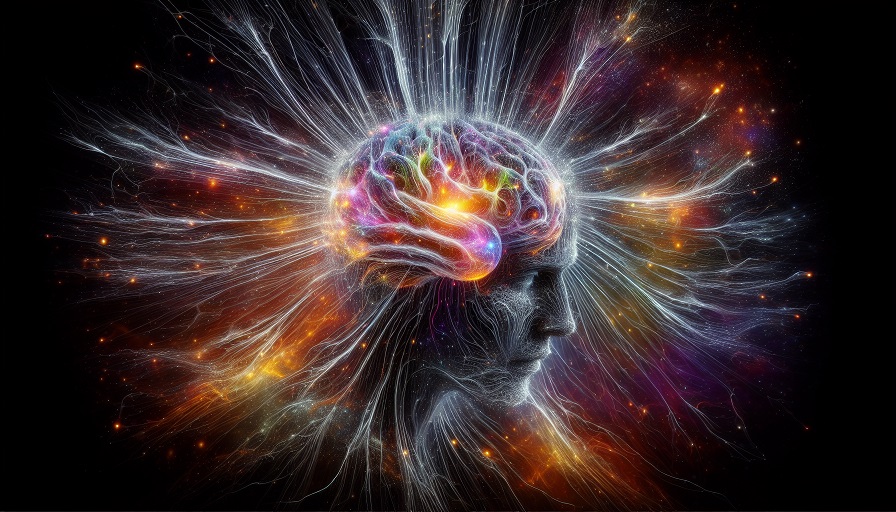
If you’ve ever experienced anxiety, you know it’s not just “nerves” or a bad day. It’s an all-consuming state of mental and physical overload. Racing thoughts. Tight chest. Restless energy. The feeling that your brain is stuck in a loop, playing every worst-case scenario like a horror film with no pause button.
And yet, what’s the advice people often get? “Just calm down.” “Think positive.” “Talk it out.” As if logic alone could untangle a web of tightly wound neurochemicals. But here’s the hard truth: you can’t think your way out of anxiety – because anxiety doesn’t start in your thoughts. It starts in your biology.
Contents
The Limits of Mindset-Based Advice
We’ve been sold the idea that anxiety is all in our heads, and that with enough affirmations or journaling, we can gain control over it. While cognitive tools like therapy, meditation, and self-awareness absolutely have their place, they often ignore something critical: the biochemical chaos happening behind the scenes.
An anxious brain isn’t malfunctioning because you aren’t “strong enough.” It’s responding to real signals – many of which have nothing to do with your thoughts. Blood sugar swings, hormone imbalances, nutritional gaps, and chronic stress all play a major role in fueling the anxiety cycle.
So if mindset tools aren’t working for you, it’s not a failure of discipline. It’s a sign that your brain might need more support than positive thinking can provide.
Anxiety Is Physical First, Mental Second
Here’s what most people don’t realize: anxiety originates in the body, long before it reaches the conscious mind. It’s a nervous system response – a protective alarm. When your brain senses threat (real or perceived), it triggers a cascade of stress chemicals like cortisol, adrenaline, and norepinephrine.
This stress state puts the prefrontal cortex – the part of your brain responsible for logic, planning, and emotional regulation – on pause. Instead, your limbic system takes over, and suddenly your body is preparing for danger, even if you’re just trying to answer emails or get through traffic.
In this state, it’s incredibly hard to “talk yourself down.” Not because you’re weak, but because your brain is running a survival protocol. And it won’t stop until it gets a new signal – one that tells it, “You’re safe.”
Feeding the Brain to Calm the Mind
One of the most overlooked approaches to managing anxiety is through brain nutrition. What you eat – and what you don’t – directly affects the neurotransmitters and hormones that govern your mood, stress response, and energy levels.
Here are a few of the top nutritional factors tied to anxiety:
- Magnesium deficiency: Known as the “relaxation mineral,” low levels of magnesium can increase cortisol and make it harder to shift out of fight-or-flight mode.
- Low omega-3 intake: These essential fats help regulate inflammation and support emotional balance.
- B vitamin depletion: B6, B9 (folate), and B12 are essential for producing serotonin, dopamine, and GABA – all of which are critical for anxiety regulation.
- Gut-brain imbalance: A disrupted gut microbiome can alter brain signaling and increase susceptibility to anxiety.
- Blood sugar instability: Fluctuations in blood glucose can mimic panic attacks and worsen anxious symptoms.
If your body is deficient in these key nutrients, your brain can’t create the calming chemicals it needs to regulate your emotions. That’s not about mindset – it’s about missing resources.
Where Brain Supplements Can Help
In a perfect world, we’d get all our brain-boosting nutrients from food and rest. But real life is messier – stress is constant, diets aren’t perfect, and our nervous systems are often stuck in overdrive. That’s where high-quality nootropics and brain supplements can offer tangible support.
Take L-Theanine, for instance. Found in green tea, it promotes alpha brain waves that are associated with calm alertness. Or Rhodiola Rosea, an adaptogen that helps reduce fatigue and supports stress resilience. Bacopa Monnieri may improve memory while also reducing cortisol levels over time.
These aren’t stimulants or sedatives. They work by nudging your nervous system back into balance. Products like Mind Lab Pro combine these ingredients to support both short-term calm and long-term brain health – making it easier for you to regulate anxiety from the inside out.
Again, they’re not magic pills. But they’re powerful allies in a holistic anxiety strategy, especially when your brain needs extra support to stay centered.
The Power of Changing Your Input
When it comes to anxiety, people often focus on changing their output – thoughts, behaviors, habits. But if the input to your brain is poor (nutritionally, emotionally, environmentally), then no amount of output control will fix the problem.
Supporting your brain doesn’t just mean eliminating stress. It means giving your nervous system the building blocks it needs to feel safe and regulated. Only then can the higher parts of your brain – the parts responsible for rational thought and calm decision-making – come back online.
You can’t muscle your way through anxiety. You have to nourish your way through it.
Anxiety isn’t all in your head – and it’s not a character flaw. It’s a brain state. And while mindset work has value, it’s often like shouting logic into a storm. If you want your thoughts to change, you need to calm the storm itself.
That starts with supporting your brain – nutritionally, emotionally, and biochemically. Whether that’s improving your diet, prioritizing rest, spending time in nature, or using brain-targeted supplements, the goal is the same: to build a brain that doesn’t default to panic.
You don’t need to fight anxiety with willpower. You need to feed the system that keeps it in check. Because once your brain feels safe, your thoughts will follow.

